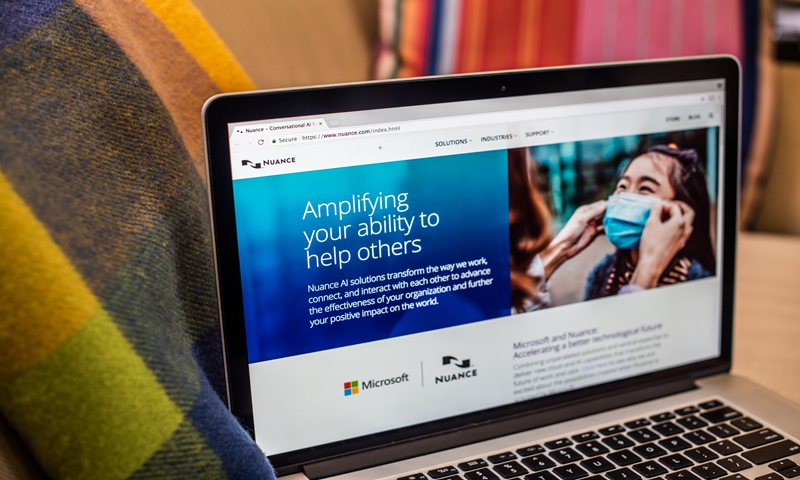
The Nuance Communications Inc. website on a laptop computer arranged in New York, US, on April 13, 2021 Photo: VCG
EU's antitrust regulator is taking a deeper look into Microsoft Corp's $16 billion deal for transcription technology company Nuance Communications Inc, asking customers and competitors to draw up a list of concerns, according to a questionnaire from last month seen by Reuters.
The previously unreported outreach is the most extensive by an antitrust authority since the companies announced the acquisition in April, according to a person familiar with the matter.
Microsoft declined to comment, and Nuance did not respond to a request for comment.
The companies filed for approval from the European Commission's competition bureau in November, and the regulator has until December 21 to clear the deal or open a bigger investigation.
The companies had expected to close the deal by the end of this year, but said in November the timeline could slip to early next year.
The questionnaire asks whether Microsoft and Nuance are competitors and whether a tie-up could affect clients and rivals, including whether Microsoft could favor Nuance over competing services.
After minimal review, the Australian Competition Commission in October said it would not contest the deal. Microsoft has won US antitrust approval in June for its deal to buy artificial intelligence (AI) and speech technology company Nuance, according to a filing made by Nuance to the government.
The $16 billion deal, which was announced in April, came after the companies partnered in 2019 to automate clinical administrative work such as documentation.
It shows Microsoft's ambition to extend its leadership into an industry where digital transformation has picked up speed during the pandemic. Healthcare providers have invested more in technology to improve productivity and digital health services.
"This acquisition brings our technology directly into the physician and patient loop, which is central to all healthcare delivery. The acquisition will also expand our leadership in cross-industry enterprise AI and biometric security," Microsoft CEO Satya Nadella said on an investor call.
Nuance primarily sells transcription technology that is popular among doctors and call centers that want to automate note-talking. The company is known for pioneering speech technology and helping launch Apple Inc's virtual assistant, Siri.
Analysts view the deal as bolstering Microsoft's presence in the healthcare market, and bringing it new voice and medical data to train AI offerings in health, speech and biometric security.
Like other big tech companies, Microsoft for years has grown its business through acquisitions, such as in advertising and video gaming. But in the last decade, Microsoft has avoided the target that recently has dogged its competitors Alphabet Inc's Google, Facebook Inc, Apple and Amazon.com Inc, all of which are facing antitrust lawsuits and investigations on numerous issues.
Steven Weber, a University of California Berkeley professor studying the intersection of technology and health care, said possible concerns about the pending deal could include Microsoft forcing its Office suite on Nuance customers by bundling them together.
Nuance has said it serves 77 percent of US' hospitals, providing intelligent solutions including clinical speech recognition, medical transcription and medical imaging.
With operations in 28 countries, the Burlington, Massachusetts-based company reported $1.5 billion in revenue in fiscal-year 2020, with two-thirds of it coming from healthcare.
A key to its success has been has ensuring in deals with customers that it could use their data to advance its voice recognition systems, according to former chief executive Paul Ricci and another former employee.
For instance, a Nuance contract with Augusta University Medical Center, obtained by Reuters this year through a public records request, reads, "Customer shall provide Nuance access to voice and text data...and grants Nuance a perpetual, royalty-free license to copy, use and analyze such data for speech recognition research."
Big cloud vendors such as Amazon and Microsoft typically do not have unfettered access to customers' data for research and development. But the opportunity to acquire those relationships and data explains Microsoft's interest in Nuance, the former employees said.
Other providers of health transcription technologies include 3M Co and Philips.



